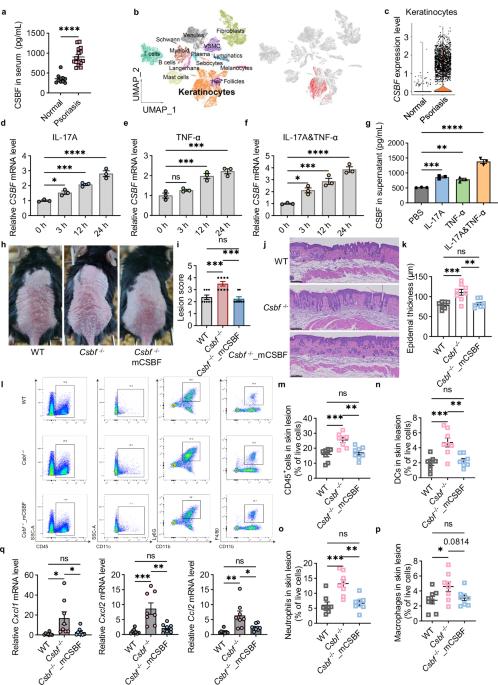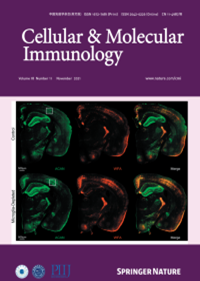细胞因子CSBF通过角化细胞中SUSD2-ACT1抑制IL-17A和TNF-α炎症通路,减轻imq诱导的银屑病。
IF 19.8
1区 医学
Q1 IMMUNOLOGY
引用次数: 0
摘要
角化细胞中炎症信号的过度激活对银屑病皮肤炎症至关重要,但其调节机制仍不完全清楚。在这里,我们证明细胞因子CSBF抑制角质形成细胞中IL-17A和TNF-α (IL-17A/TNF-α)诱导的个体和协同促炎信号,在银屑病炎症中发挥保护作用。银屑病患者皮损及血清中CSBF表达增加,IL-17A/TNF-α增强其产生。Csbf缺失加重了imq诱导的牛皮癣样皮肤炎症,并导致角化细胞中IL-17A/TNF-α信号的过度激活。CSBF蛋白显著改善银屑病的表现,并通过受体SUSD2抑制IL-17A/TNF-α信号传导。机制上,CSBF-SUSD2与TRAF6和TNFR1竞争,与ACT1相互作用,抑制IL-17A/TNF-α信号通路。总的来说,抗炎细胞因子CSBF有潜力通过靶向角质形成细胞成为银屑病的治疗选择。本文章由计算机程序翻译,如有差异,请以英文原文为准。

The cytokine CSBF inhibits the IL-17A and TNF-α inflammatory pathways via SUSD2-ACT1 in keratinocytes and alleviates IMQ-induced psoriasis
Overactivation of inflammatory signaling in keratinocytes is critical for psoriatic skin inflammation, but its regulatory mechanisms remain incompletely understood. Here, we demonstrate that the cytokine CSBF inhibits both individual and synergistic proinflammatory signaling induced by IL-17A and TNF-α (IL-17A/TNF-α) in keratinocytes, playing a protective role in psoriatic inflammation. The expression of CSBF was increased in the skin lesions and serum of psoriatic patients, and IL-17A/TNF-α enhanced its production. Csbf deletion exacerbated IMQ-induced psoriasis-like skin inflammation and led to hyperactivation of IL-17A/TNF-α signaling in keratinocytes. The CSBF protein significantly ameliorated psoriatic manifestations and suppressed IL-17A/TNF-α signaling through the receptor SUSD2. Mechanistically, CSBF-SUSD2 competed with TRAF6 and TNFR1 for interaction with ACT1, inhibiting the IL-17A/TNF-α signaling pathway. Overall, the anti-inflammatory cytokine CSBF has the potential to be a therapeutic option for psoriasis by targeting keratinocytes.
求助全文
通过发布文献求助,成功后即可免费获取论文全文。
去求助
来源期刊
CiteScore
31.20
自引率
1.20%
发文量
903
审稿时长
1 months
期刊介绍:
Cellular & Molecular Immunology, a monthly journal from the Chinese Society of Immunology and the University of Science and Technology of China, serves as a comprehensive platform covering both basic immunology research and clinical applications. The journal publishes a variety of article types, including Articles, Review Articles, Mini Reviews, and Short Communications, focusing on diverse aspects of cellular and molecular immunology.

 求助内容:
求助内容: 应助结果提醒方式:
应助结果提醒方式:


